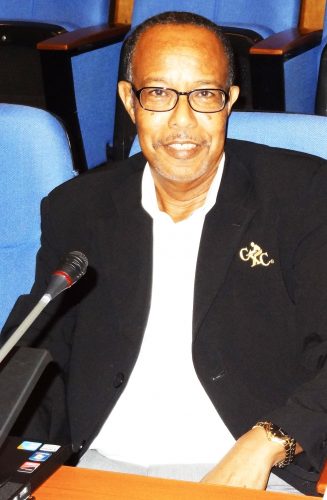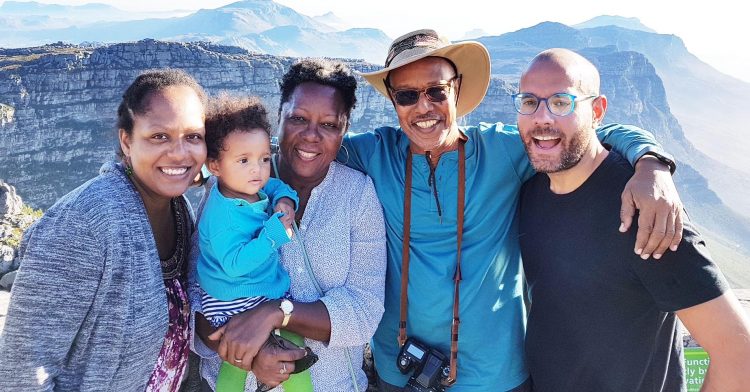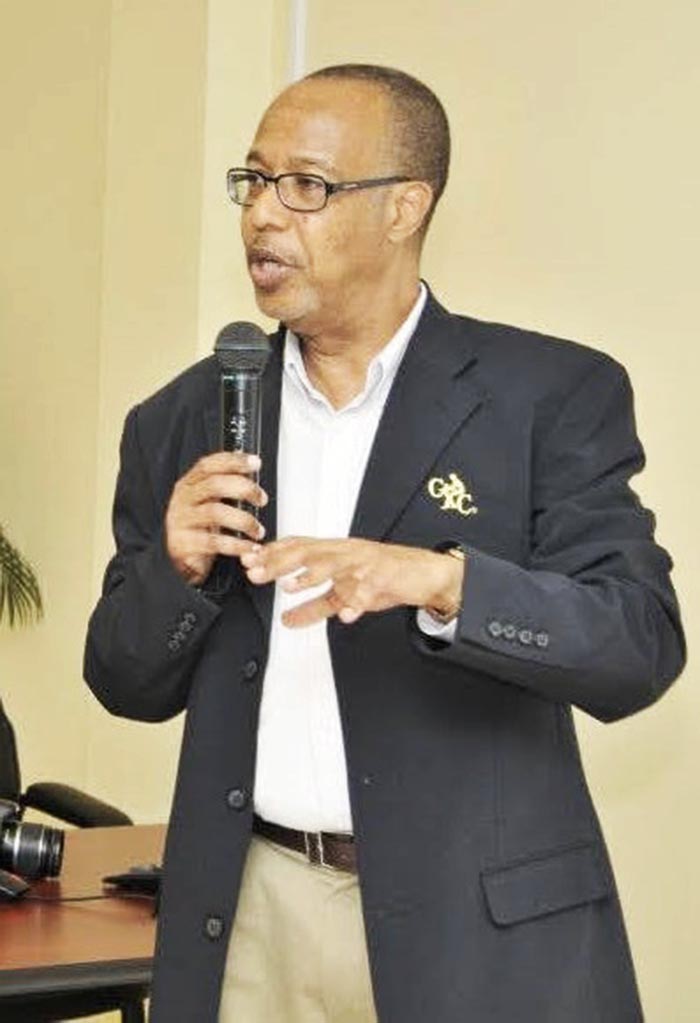By Miranda La Rose
Educational measurement and assessment specialist Dr Gordon Hilton Nicholas ‘Nicky’ Harewood, 70, who has spent his entire working life in the field of secondary education, says most of his teaching stories are positive and interacting with students who challenged him and who now excel, made him grow professionally.
“Those are the things that make teachers feel forever young and energetic. Most teachers, including myself, get a really big vicarious kick from the achievements of our students. We like to say among ourselves, ‘I know so and so. I taught him or her at President’s College or North Georgetown Secondary School (NGSS) or Lilian Dewar College of Education (LDCE),’” Harewood told Stabroek Weekend in an interview from Barbados where he resides.

Harewood, was born at 41 Public Road, Kitty where he grew up with mainly his mother, Margarita Harewood, then librarian at the National Library, and two other siblings. His late father, Hilton Harewood, a journalist, died when he was young.
School and work
Harewood attended Sacred Heart Primary and Queen’s College.
“I really liked, especially the sixth forms at Queen’s College, when I started to realise there was more to life than books,” he recounted. “We had fantastic teachers who spent time talking about life in general. I did the arts, French, Spanish and English Literature at A-Levels. As prefects, we hung out in that elevated area at the back of the auditorium we called the balcony, before the admin building was burnt down. We argued, solved all the problems of the world, teased and talked about girls. In those days Queen’s was an all-boys school.”
As soon as he finished high school in 1970, his mother told him to find a job. He secured one in the finance section of the Ministry of Education balancing receipts and payments. “It was really boring. I looked forward to the half-days on Saturdays when I could lime with friends,” he said.
Not long after, then assistant chief education officer Benjamin Agard learnt of Harewood’s educational background and told him he was placing him at NGSS which had opened its doors the year before. Agard said he was looking for teachers because the ministry was filling the school with bigger students from the tops of primary schools.

“I had wanted to teach and this was the opportunity. I like to tell people that in July 1970, I was sitting in front of a teacher’s desk and in September, I was behind a teacher’s desk,” he said.
He taught at NGSS while pursuing a bachelor’s degree in Spanish and English Literature at the University of Guyana (UG). He graduated in 1973.
“Just out of school, it was interesting teaching some of the students who knew me from Kitty and some who were bigger in size,” he recalled. “Teaching at North was as much an exercise in education for me as it was for the students I taught. I’m really proud I was able to play a little part in their success.”
NGSS had a diverse group of teachers like the “late Mr Ralph, the first head, the late Dr Daphne Persico, Mrs Douglas and Mrs Etkins who encouraged the younger teachers and fostered the spirit of love for teaching,” he said. This saw Harewood and several others continue in the profession at different levels.
“We had an in-between group that included Maurice Agrippa, senior master, who had returned from the University of the West Indies (UWI). He coached us younger ones on the ins and outs of teaching. Some had gone through teachers’ training college. There were schoolmates like Compton Bradshaw, Donald Sinclair and me who had no type of professional training except for A-levels and were university students who were thrown into the deep end to teach,” he recounted. “There was Arlington Bancroft and Randolph Scott. We were sometimes hot-headed young men with different types of experiences.”
After he graduated from UG in 1973, one of his former teachers at QC and at UG, Dr Alan Persico, then a tutor at LDCE, asked Harewood to stand in for him as a modern languages and pedagogy tutor, while he was away on a one-year scholarship. Harewood took over the Spanish classes that were small in number with no more than three or five students. The staff at Lilian Dewar were all seniors in the profession and were supportive.
“They gave me good material to read and allowed me to sit in their classes to observe them in action,” he said. “I became friends with some of the students and we remained in contact long after I left LDCE and taught with some in my own teaching career, including Patrick Zephyr, at Charlestown Secondary.”
At Charlestown Secondary, where he taught for four years, Harewood started the two-year masters of education degree programme at UG. “It was the first masters of education programme there with a class of 28. The only other education master’s programme was in history. We had senior education officers, some were lecturers at Cyril Potter College of Education and LDCE, some were principals and deputies, some were teachers like me with experience and some were in their early teaching career,” he said.
The programme was funded by the Commonwealth Fund for Technical Cooperation. Dr Desmond Broomes, a lecturer in the Faculty of Education, UWI, Cave Hill Campus, facilitated the programme, which included guest lecturers from the University of Toronto and other institutions.
Harewood majored in curriculum development, implementation, and evaluation and educational assessment.
When he graduated in 1978, Harewood said, Broomes, who was the consultant to the Curriculum Unit in the Ministry of Education suggested that he join the unit, which he did, focusing on modern languages and teachers’ professional development.
After developing some supplementary and other materials for students preparing to sit Spanish at the Caribbean Examinations Council (CXC), Harewood wanted to go back into the classroom and joined the staff at North Ruimveldt Multilateral School in 1980 where he was a senior master.
“At North Ruimveldt, I felt I needed to get a PhD before I became too old. I looked for scholarships in education but no one was giving them,” he recalled.
On the advice of then education minister Jeffrey Thomas, Harewood applied for a scholarship through the Public Service Ministry and was successful.
In 1982 he was off to the University of Toronto to pursue a doctorate in curriculum and educational assessment.
President’s College
Even before he graduated with the PhD, he was assigned to the new residential President’s College (PC) as its first deputy principal.
“I was there from the first day of classes in September 1985 and was fortunate to teach the first cohort of students. When I left in February 1990, they were about to write their Caribbean Secondary Education Certificate examinations. PC, in some ways, was similar to NGSS, with students keen to learn, but PC was different in that, academically, they were less diverse than North. North was very diverse academically and some students were challenged to keep up with the high flyers and the in-betweens,” Harewood said.
“At PC students were from among the top tier of the then Secondary Schools Entrance Examinations. Classes were small. Students knew they were bright and full of confidence but they were not arrogant. People who were there in whatever capacity were fully committed to the idea and ideals of PC. We got mixed reviews from people who believed the students were placed
in the residential setting to be brainwashed. There was nothing of the sort. We had on the staff some of the most radical thinkers.
“WPA was a bad word in those days. We never asked each other about political allegiances, but from the way they behaved and what they said you got a sense of their political leanings. It was never an issue.
“President Forbes Burnham, whose brainchild the school was, had died just before the school opened. Guyana was going through some changes and students were encouraged to question everything and they certainly did. They excelled in academics but they also did National Service, which I knew, they thoroughly enjoyed. We had a working farm that provided some of the food in the kitchen. Beef cattle, milk cattle, chickens, pigs and water buffalos that used to get away and cause lots of trouble.
“The whole idea was to produce students of excellence but with a predisposition to serve their community and their country. Of course we didn’t get 100 percent of our students remaining in Guyana but when I look around I see a large number of those PC students excelling in top positions in the fields of medicine, law, finance and other professions in Guyana, the Caribbean and beyond. Even though abroad they have remained grounded and committed to Guyana. They are not only excelling but they are humane about what they do.”
Harewood said he and the late Joe Holder, a past president of the school’s Parent-Teachers Association, once reflected on the number of their cohort from Queen’s College who did not migrate. “From my cohort the most I counted was four. Joe had counted three. We had set this lofty goal that PC would have 90 percent of each year’s group remaining in Guyana. I don’t think we achieved that but I enjoy the idea that students I taught can go beyond Guyana and excel,” he added.
CXC
In late 1989, Broomes, who had returned to UWI and was a CXC consultant, invited Harewood to apply for a position in the measurement and evaluation division for modern languages at the CXC Secretariat in Barbados.
“I told Dr Broomes I was on a contract with months remaining,” he recalled.
He applied and while he did not get that job, he was offered the position of assistant registrar for history, geography, social studies and to produce a religious education syllabus.
Harewood approached PSM for a release and was rejected. The then education minister and permanent secretary were against him leaving.
Two principals, Oswald Kendall and Henry Hinds, had left PC. He reported to the CXC secretariat that he would not be available until August 1990 when his contract was up, and was told that was unacceptable. The chairman of CXC at the time was Guyanese Professor Dennis Craig.
“I didn’t know then that Professor Craig and then President Desmond Hoyte were good buddies,” Harewood said. However, a few weeks later, he was told to start his handing over exercise at PC. He was informed that he would still be under contract to Guyana, but serving at the regional level.
He joined CXC in February 1990.
“I had no formal orientation. I had the academic background in measurement and evaluation, but I had no practical experience,” he said. “I’d sat on committees in Guyana with the national exams but I wasn’t responsible for them. I had done work on the CXC modern languages syllabus panel and I had also marked and was a table leader for CXC Spanish while working in Guyana, so I felt I knew all about CXC. But then I was given files and binders that were literally about six inches thick with statistics, reports of past exams and minutes of meetings. I had to digest all of that.”
His job was to advise examination committees on ways to set good question papers on Caribbean history, social studies, geography and religious education.
“They had the content knowledge, I provided the assessment expertise so they would provide good questions and fair marking schemes. I knew all of that in theory, but to actually have the responsibility of doing this in ways that would affect the lives of, in those days, tens of thousands, now it’s more, was a huge responsibility,” he noted.
“I had to go through the paper setting, then the marking exercise, how to deal with students who provide answers that you never considered in your mark scheme; how to deal with students if they appeared to have cheated. I had to provide guidance to the examining committee. Then I had to advise the syllabus committee in the production of the syllabuses, which in those days were black and white. I started as an assistant registrar/manager, was promoted to a coordinator and finally was head of production, measurement and assessment.”
Before becoming the head, he was appointed to the position of senior manager in the production division. A year later CXC underwent structural changes and the production division was merged with the measurement and evaluation division and Harewood was appointed the head.
“So I was back again in measurement and evaluation,” he said.
“The production division was like a shock to the system because it had gone into full-scale digital printing. The technical part was done by others. The measurement and assessment were the major part of my job. This was a shift. It made me take assessment more seriously than when I was a teacher. When I was a teacher, you set those questions a couple of days before the test. CXC made me realise there is a lot more technical stuff going into setting reliable and fair examinations and you need to adhere to these principles of assessment if you want to set good question papers. That was a major shift from classroom teacher to measurement and assessment officer/advisor.”
His focus since retiring from CXC in April 2013 has been on curriculum reform in Guyana and the region mainly as an educational assessment advisor.
“My focus is not just what students know to obtain a certificate but using assessment to promote and facilitate student learning. So formative assessment for learning has been my focus for almost a decade now,” he said.
He has been working in Guyana in the curriculum process. This started during the last administration and continues under the current administration.
“I work in other parts of the region but Guyana is home. It gives me a thrill to see the work in education taking place in Guyana,” Harewood said.






